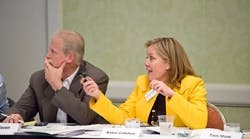More than 40 leaders in industry, finance, research, and policy convened in Carlsbad, CA in November for the latest installment in the Danfoss EnVisioneeringSM Symposium series. Their objective was to discuss issues and opportunities that face the HVACR industry now, and in the near future. Topics included climate change theory, energy efficiency, refrigerants and pending federal legislation.
Robert Wilkins, president of Danfoss in North America, welcomed attendees. “Never before has the HVACR industry been at the forefront of so many critical global issues as it is at this moment,” said Wilkins. “The economic trends we currently face are influencing collective business decisions today that will shape decades to come.”
Kevin Fay, president of Alcalde & Fay, a leading government relations and public affairs firm focusing on atmospheric and energy policy issues, projected that energy, energy security and “green” jobs should be high on the Obama administration’s agenda, and will likely be part of an economic stimulus bill in early 2009.
“I think there is tremendous opportunity in terms of energy efficiency improvements and programs for the industry at large, if we find a way to position ourselves on that,” Fay said.
Fay projected that climate change legislation would not pass before late 2009 or 2010.
David McIntosh, who served as Senator Joseph Lieberman’s counsel and legislative assistant for energy and the environment, focused on the changes the HFC refrigerant phaseout will have on the HVACR industry.
McIntosh projected that future energy legislation could include “mandates on new energy-efficiency standards among manufacturers, as well as subsidies and tax incentives for the manufacturers and the purchasers of the equipment.”
Other issues discussed during the EnVisioneering symposium included energy efficiency, and related business opportunities.
Kateri Callahan, president of the Alliance to Save Energy, led the discussion on energy efficiency. According to Callahan, capturing the potential energy savings available from existing technologies could potentially reduce the growth of global energy demand by more than half or more in the next 15 years.
Joseph Turk, president of PWI Energy Inc., Philadelphia, PA, a Johnson Controls energy service company, said individuals and industry need to solve the problems related to energy efficiency, and not rely on Congress.
“We need to change the way we live to support changes in energy efficiency. And, the companies that are doing that already are creating business opportunities for the future,” Turk said.








